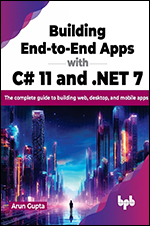C#: A Beginner's Guide
- 3h 58m
- Pat McGee
- McGraw-Hill/Osborne
- 2015
C#: A Beginner's Guide offers a step-by-step approach to learning object-oriented programming with C# and the .NET Framework while preparing you for data driven-development. More than 150 easy-to-follow examples are included. The book covers Visual Studio for development and debugging, collections and advanced C# structures, LINQ and traditional database development, as well as file, XML, and JSON handling. By the end of the book, you'll have the foundation you need to begin developing advanced data-driven applications in any C#-based platform.
Designed for Easy Learning
- Key Skills & Concepts--Chapter-opening lists of specific skills covered in the chapter
- Try This--Hands-on exercises that show you how to apply your skills
- Notes--Extra information related to the topic being covered
- Tips--Helpful reminders or alternate ways of doing things
- Cautions--Errors and pitfalls to avoid
- Self Test--End-of-chapter quizzes to reinforce your skills
- Example code with commentary that describes the programming techniques being illustrated
About the Author
Pat McGee is a software development instructor and curriculum developer at the British Columbia Institute of Technology. A former game programmer, he is the coauthor of Microsoft XNA Game Studio Creator's Guide and is a recipient of Microsoft's Most Valuable Professional award for DirectX and XNA.
In this Book
-
Introduction to C# Coding and Debugging
-
Variables, Constants, Arrays, and Enumerations
-
Numeric Operators and Routines
-
Methods and Scope
-
Conditional Structures and Loops
-
String Manipulation
-
Date and Time Handling
-
Encapsulation Through Object-Oriented Programming
-
Inheritance
-
Generic Types and Collections
-
Delegates, Anonymous Functions, and Events
-
Interfaces
-
Database Setup
-
The Entity Framework
-
LINQ to Entities: Query Syntax
-
LINQ to Entities: Method-Based Syntax
-
Join Queries with LINQ to Entities
-
Traditional Database Development
-
File Input Output
-
XML Handling
-
JSON Handling
-
Attributes
-
Operator Overloading
-
Appendix—FoodStore Database Reference




